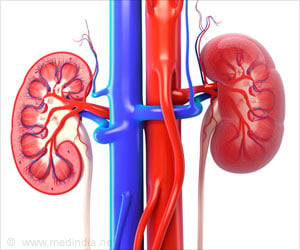Drinking soft drinks to rehydrate after heat exposure might aggravate dehydration and kidney damage.

- Using a sweetened beverage like a
Rats were divided into three groups and exposed to heat stress. The first group was offered plain water, the second was given water containing fructose and sucrose in concentrations (11%) similar to that found in soft drinks, and the third was offered water containing stevia (non-caloric sweetener) for two hours following heat exposure. All the groups were given plain water for the rest of the day. This study was conducted over a period of 4 weeks. An increased oxidative stress and renal inflammation were observed in all groups except the one fed on plain water. This confirmed the association of dehydration with renal injury.
Moreover, the degree of renal injury was the maximum in the group that was fed on the fructose-sucrose water.
The study raises concern on two main issues:
- The association of dehydration with chronic kidney injury
- Increased secretion of vasopressin (a hormone that promotes water retention and an increase in blood pressure).
- Activation of the aldose-reductase-fructokinase pathway.
- Chronic hyperuricemia (increased uric acid in the blood).
There was an increase in intake of water observed in the groups fed on fructose-sucrose water as well as the stevia-containing solution. Despite the increased intake, there was increased kidney damage in the former group.
The authors of the study said, "Our studies raise serious concerns for the common practice, especially among adolescents and young adults, to drink soft drinks as a means to quench thirst following an episode of dehydration.’’
Another interesting observation was the reduction of kidney injury and arterial pressure in the stevia-fed group. A possible theory is the action of stevia as an osmotic diuretic to negate the effects of hypertension induced by dehydration and the resulting kidney injury but it needs to be investigated further for confirmation.
A literature review conducted in the year 2014 analyzed the association of sugar-sweetened soda and chronic kidney disease. Studies that reported odd ratios comparing CKD incidence in patients who consumed sugar-sweetened sodas in significant quantities as compared to those who consumed artificially sweetened sodas were included, a total of five in number. Pooled risk ratios (RR) were calculated. The pooled RR of the group that consumed sugar-sweetened sodas was found to be 1.58 while that of the group which consumed artificially sweetened sodas was 1.33. Thus, the review and meta-analysis of the five studies revealed a statistically significant difference in risk between the two groups in relation to CKD.
The rat study by Garcia-Arroyo reaffirms the association of sugar-containing drinks and kidney injury, albeit in rats.
This makes it pertinent to not only avoid dehydration due to heat in summers as it may cause kidney damage but also choose water over any other drink to rehydrate the body after any exposure to heat stress.
References:
- You Are
What You Drink! Editorial Commentary: Rehydration with Soft Drink-like
Beverages Exacerbates Dehydration and Worsens Dehydration-associated Renal
Injury
http://ajpregu.physiology.org/content/early/2016/06/03/ajpregu.00222.2016.full.pdf+html - Heat
acclimation and thirst in rats
http://www.ncbi.nlm.nih.gov/pubmed/23439375














